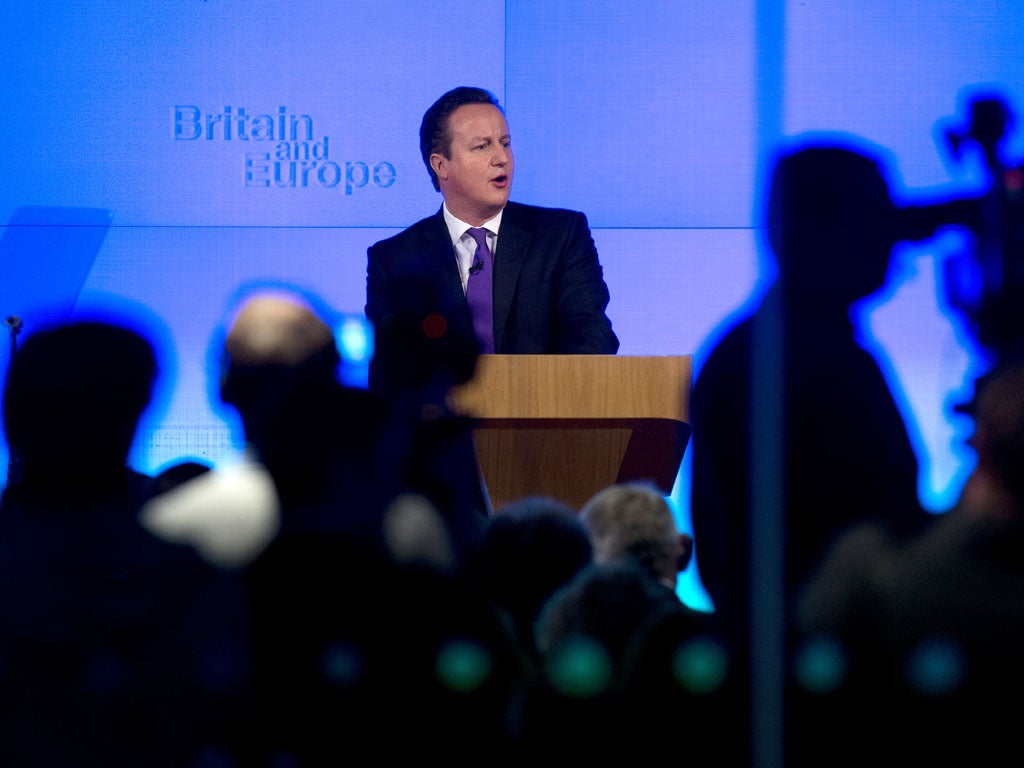Hang on to your hats – the referendum will be a bumpy ride
The timing will be very delicate, as Prime Ministers do not call referendums unless they are sure that they can win them


Rarely a day passes without a campaign launch in relation to the referendum on the UK’s membership of the European Union. We might not have the date, but we do have plenty of campaigns. Yesterday the In combatants put their case. Last week one of several organisations arguing for Out unveiled leading figures.
How odd it all is. Of the challenges facing this country, EU membership should be well down the list. More urgent concerns include how we pay for the NHS and elderly care, how we finance much needed infrastructure projects including additional housing, how to deliver services when faced in some cases with cuts of 40 per cent in the current spending review, how we re-balance an economy once more heavily dependent on the City of London and booming house prices. Yet Europe will dominate politics for at least the next year.
I have no doubt the David Cameron and George Osborne would rather concentrate on other matters too. Both will rationalise that a referendum at least means they have the chance to settle the question of Europe for the foreseeable future. But that depends on winning it by a very big margin. This may happen, but they probably would rather not have taken the risk. Indeed we know they wouldn’t. Early in their first term they passed legislation that guaranteed a referendum on any future EU treaty transferring power to Brussels. They hoped it would be enough to avoid an In/Out referendum, but this historic reform, backed by the other parties, was not even a sticking plaster on internal Tory divisions. With Ukip soaring, Cameron had no choice but to offer a referendum.
As ever with referendums, its offer brought calm. By contrast, holding it will cause mayhem, which is why leaders often offer plebiscites and rarely stage them.
The “Stronger in Europe” launch yesterday had echoes of New Labour in its counter-intuitive pitch. The Out campaign claims to be making the patriotic case. A party campaigning for Out has the words United Kingdom in its name. In response, the Union Jack featured heavily at yesterday’s unveiling of the In campaign, just as New Labour seized the national symbol from the Conservatives in the mid-1990s. As is now the fashion, business leaders and other public figures dominated the event rather than politicians.
Inadvertently the speakers showed the limitations of deploying non-politicians. Their projection was slightly awkward and no questions were allowed from journalists. Politicians are used to media scrutiny and on the whole know how to answer questions at a high-profile press launch. Other figures might be trusted more by voters, but they are held to account less ferociously. One way or another the non-politicians will be interrogated fiercely in this campaign so they had better get used to it.
Cameron had no choice but to offer a referendum during the last parliament and the organisers of the In campaign similarly had no alternative but to launch now or else leave the field to the opposition. Yet the various launches convey a curious combination of seemingly urgent fizz and the feel of a premature skirmish. Cameron has not finished his negotiations, let alone named the date. The Scottish referendum campaign felt very long until the final months of climactic engagement, but at least the various campaigners knew the date of the poll from the very beginning.
The timing for Cameron will be extremely delicate. Prime Ministers do not call referendums unless they are sure they can win them. It is possible that Cameron could complete his renegotiation relatively soon, take a look at the opinion polls, find the Out campaign is ahead, and suddenly find cause to return to the negotiating table in order to delay the day of reckoning.
My guess is that the referendum will be held in 2017, partly because the polls will not be safe enough for Cameron to risk calling it next autumn. Before the introduction of fixed-term parliaments, fragile prime ministers delayed calling a general election in the hope that fortunes might change. Cameron will choose to play long with his referendum unless the polls suggest victory is almost certain next year.
More practically, negotiations might take a long time. Unlike Harold Wilson, who held the first referendum on UK membership in 1975, Cameron is negotiating in an EU of 28 countries. When Wilson sought new terms there were nine.
There is another big difference. Wilson renegotiated mainly to give him protective cover for his latest U-turn on the issue rather than to persuade his party. His MPs and cabinet ministers had decided on their positions irrespective of the renegotiation. Now some key figures claim at least to be awaiting the outcome of Cameron’s new deal before deciding. Boris Johnson will not declare until then. Nor will Theresa May.
In reality they also await the political mood when renegotiation is over. If within the Conservative party and beyond it is scathing or disdainful, they may be tempted to join the Out campaign. It seems a superficial way of making a pivotal judgement on the future of the country: Where does this leave me? If that is their calculation the referendum will again be in marked contrast to 1975 when the prominent figures on both sides had held their positions for a very long time.
Potential Conservative leadership contenders will not be alone in making their judgements on the basis of mood rather than substance or even conviction. Referendums are partly about mood rather than reason or evidence. The anti-politics mood will play its part in the Europe referendum as it did in Scotland, but perhaps fear of change will be ultimately more potent. Either way voters will make history when they decide – at least until the third referendum is held.


Join our commenting forum
Join thought-provoking conversations, follow other Independent readers and see their replies